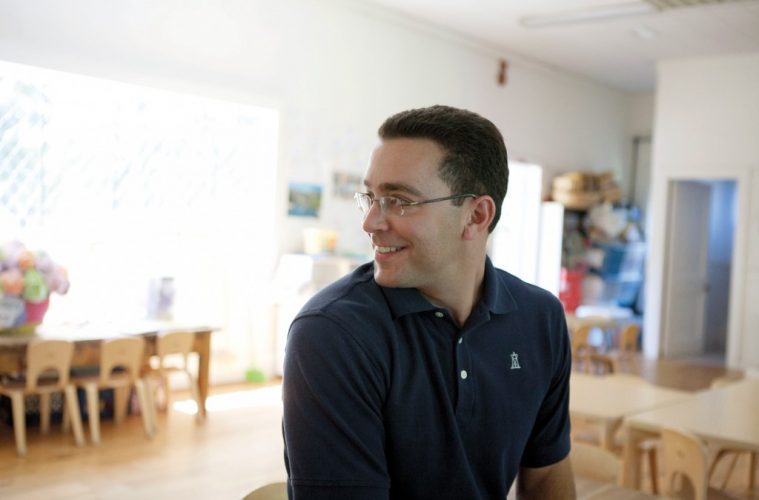A young Marblehead scientist sells his pharmaceutical startup for a not-so-small fortune, using his millions to save the town’s loved Devereux School from shutting its doors. By Alexandra Pecci
Devereux school’s shady, sloping backyard is a rush of activity, even in mid July. Camp Devereux is in full swing, with kids zooming down slides, pushing toy dump trucks full of sand, and learning how to swim. Todd Zion, PhD, stands at the edge of the pool with his arms folded across his chest, watching his three children-Jonathan, 9, and twins Lauren and Audrey, 8-do freestyle strokes from end-to-end.
“This is a pretty intense group here,” Dr. Zion says of the children in the pool. “They work pretty hard.”
Hard work seems to be in Dr. Zion’s blood, but at this point in his life, it’s optional. Just 36 years old, he could retire today. That’s because Dr. Zion developed SmartInsulin, a product with the potential to revolutionize treatment for diabetes. The pharmaceutical giant Merck purchased his start-up company, SmartCells, in a deal that could add up to more than $500 million.
But Dr. Zion isn’t going to retire. Far from it, in fact. Instead of opting for a life of leisure on some sandy beach or buying a fleet of luxury cars, he did what was maybe the most unlikely thing for a newly minted millionaire to do: buy his kids’ elementary school to save it from closing. “I know it’s the right thing,” he says. “So when it’s the right thing, you just do it.”
For 80 years, the Devereux School has been a Marblehead institution, ever since Elizabeth Dooling Georges founded the school out of her home on Devereux Street in 1932. Elizabeth was eventually joined in the endeavor by her sisters, who ran the school “until they were [no longer able to do so],” says Elizabeth’s daughter, Beth Russell. For nearly eight decades, the school remained family-owned and operated, with Russell and her sister, Kathy Gates, eventually taking over its operations. “I’ve been involved in the school since I was young, and I’ve worked there full time since 1971,” says Russell, a teacher. Gates had taught there since 1969.
But when their aunt, Mildred Dooling, the last of Elizabeth’s sisters, passed away in 2003, the school became the center of a drawn-out legal battle between family members. “She always said that the school would be going to us,” Russell says of her aunt, who owned the school and property at the time of her death. “But that’s not the way it happened.” Instead, Mildred, who had no children, left her estate to all eight of her nieces and nephews.
“My sister and I, who had been there forever, wanted to keep the school going,” Russell says. “The other beneficiaries of my aunt’s estate wanted to close and sell it.”
Russell and Gates kept the school open through years of legal wrangling, but eventually, the dispute settled in favor the other beneficiaries. In autumn 2010, the Devereux community learned that their school would be closing. “They just put up a wonderfully heroic fight to try to keep the doors open here,” Dr. Zion remembers. “Everyone was heartbroken.”
The Devereux parents tried to devise a plan to save the school. Dr. Zion knew that the only solution would be to buy the school from the estate, but he didn’t have the money at the time. “Nor could you round up 10 parents for a fund,” he says.
That’s when serendipity swooped in. A couple of months after Russell and Gates lost their legal battle, the scientist became an overnight millionaire. And he knew he had to act fast. “You can’t just stop school for one year,” he says. “There was an incredible amount of timing pressure.” And so, immediately after selling his start-up company for upwards of half a billion dollars, Dr. Zion and his wife Karyn became the proud owners of a Montessori school. His move might seem strange to an outsider, but it makes perfect sense to anyone who knows him.
“He kind of reeks of competency and honesty and straightforwardness and a business-like attitude, and that’s rare for people, but especially rare for somebody as young as he is,” says Jim Herriman, a Newbury resident who was also SmartCells’ vice president of operations. “Interact with him and you don’t get the feeling that he’s doing anything other than solving a problem.”
The Difference a Decade Makes
Today, Dr. Zion’s biggest problem might be whether he can someday add a few more grade levels to Devereux School, but a decade ago, he was plagued by a different problem: how to better manage Type 1 diabetes. A graduate of Cornell University in his native New York, Dr. Zion worked for a brief time at Eastman Kodak before heading to MIT to pursue his PhD in chemical engineering. He was interested in the idea of “smart” drug delivery.
“This idea of making a drug understand in real time whether it needs to be working or not, that was very fascinating to me,” Zion says. “There’s no better application [of that] than thinking about the glucose-insulin exchange for diabetes.”
People often use insulin to treat their diabetes, but it has limitations, Dr. Zion explains. Although insulin is very good at lowering blood sugar, taking too much, not eating enough, or even exercising while taking it can cause hypoglycemia. “So what I wanted to do is design an insulin that would turn itself off if your blood sugar went back to normal and then would turn itself on again as your blood sugar rose,” Dr. Zion says.
Eventually he did just that. He filed some patents at MIT and won a $50,000 grand prize in the school’s annual entrepreneurial competition. A year later, he got his PhD and spent the summer on the road searching for investors for SmartCells, his brand new company. He was also busy being dad to three children under the age of two.
“I walked at graduation, and a week later my twins were born,” Dr. Zion says. “Needless to say, we had a lot on our plate.”
Dr. Zion spent the next several years working on different iterations of SmartInsulin. According to Herriman, the SmartCells team was always confident in its product-and in its leader. Herriman says, “We always felt when we were working on SmartCells that we had two things going for us: a big idea and a guy who was very credible. People wanted to invest in him.”
And a big idea it was: Eventually, several large pharmaceutical companies became interested in acquiring SmartCells. “It was a competitive process,” Dr. Zion says, “[as] you can imagine for a product that can revolutionize juvenile diabetes.”
Eventually, Merck won. According to Merck’s statement about the acquisition, SmartCells’ roughly 150 shareholders not only received an upfront cash payment, but they’ll also be eligible to receive payments for clinical development and regulatory milestones, as well as sales-based payments down the road.
“The total potential value of the deal is 500 million-actually, in excess of 500 million-dollars,” Dr. Zion says. “I’m not able to disclose the exact number, but it was a good deal.”
Even though the SmartCells team was thrilled with the deal, for Dr. Zion, it meant giving up control of a product he’d worked so hard to create. He admits that becoming, in his words, “useless,” was a little hard for him at first. But then he realized that instead of spending all of his waking hours at work, he was suddenly able to concentrate on other things, like reconnecting with his kids. “You appreciate the things that you worked hard for and can now enjoy,” he says.
Just as Dr. Zion had to give up his company, Russell had to give up her school when it passed into Dr. Zion’s hands. But for her, the only feeling was one of relief, and she will continue to teach at the Devereux School. With the purchase, all involved in the battle for the school got what they wanted: Devereux will remain open yet the estate’s beneficiaries got to sell.
“It feels so good to know that the school will continue,” Russell says. “There’s a lot of relief and gratitude. And I feel that now that everything is settled, I have a renewed energy for being there, for my work there.” Already, Dr. Zion has made some physical improvements to the campus, and he hopes to expand the school’s offerings. He’s also in the process of recruiting a board to help with decision making.
So is Dr. Zion a modern-day superhero? First, he quite possibly revolutionizes the treatment of diabetes, then he goes and saves a school. But he says he’s motivated by something a bit deeper than just doing good for other people; it’s about tapping potential and getting the biggest results for his efforts.
“You want to have huge impact in areas where there’s such an unmet need, and in life sciences, there are plenty of opportunities to do that-certainly in diabetes. And in this situation, it’s the same kind of thing. It’s that you have the land, you have the buildings, [and] you have these wonderful teachers and this wonderful philosophy that’s turning these children into just amazing citizens,” he says. “My underlying philosophy has always been to be productive.” devereuxschool.org.

